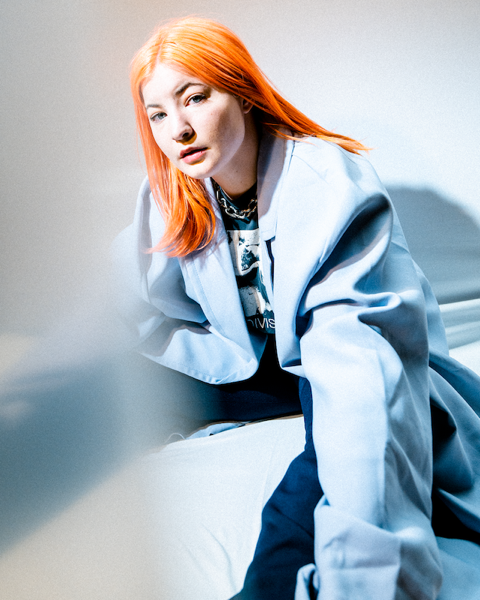
by Myles Tiessen
The music video for “Designated Driver,” one of the leading singles from Taylor Janzen’s debut LP, I Live In Patterns, sees Janzen behind the wheel driving an old 60s-era motorcar. Artistically shot using a conspicuous green screen, Janzen traverses various landscapes, supermarkets, and cattle pastures, driving with no clear destination. As the chorus builds and melodies intensify, so too does the speed of her travels. Like a bullet through a desolate purgatory with nothing to arrest her motion, Janzen cycles and flips through the pain and regret in her mind. “I swear to God I’m trying/ Not to ruin our plans/ I made myself a martyr with the holes in my hands,” she sings.
That dizzying, isochronous inevitably is exactly what Janzen intends to provoke in her music. “[I Live In Patterns] is about me feeling trapped in my own cyclical, episodic mental health issues that really seem to cycle over and over again,” says Janzen over the phone.
Her two previous EPs, 2018’s Interpersonal and 2019’s Shouting Matches, each drew respective acclaim and gained the attention of The New York Times, Noisey, Exclaim!, and others. Some even likened her to Phoebe Bridgers and Julien Baker. But, where Interpersonal and Shouting Matches thrived in the hushed intimacy of existential folk, I Live In Patterns sees the Saint-Boniface born-and-raised artist expanding her musical limits and pushing into new sonic realms.
“I had so much control over the sound on this project, and I had more input on the finished product. It’s just the product of all my influences and also my own personal ability to actually control the sound,” says the songwriter.
I Live In Patterns dates back to the days of self-isolation and pandemic misery. Janzen says she had finished writing an entire other LP that was ready for the studio. But after the lockdown gave her time to sit alone with those songs, she scrapped them all and started again.
As she worked on new material, a more focused project began to take shape in Janzen’s mind. She says she noticed similar themes recurring in her writing—mainly repetitive emotional struggles and alienation—and just how digressive her life had become. Those songs all became the explorative and poignant I Live In Patterns.
I Live In Patterns is bombastic, catchy, and some of Janzen’s most confident work, riding the line between pop and alt-rock. Where something like the lyric-driven Interpersonal immediately gripped the listener with its open-hearted lyrics and stripped-down production, I Live In Patterns’ complexity takes a few listens to digest due to its alluring, mosaic production. Something like “Fingers Crossed” employs a muddled looping sample of illusory vocals and a warbling guitar riff, while the doleful “Nightmare” gets marked by its backbreaking drum beat.
As always, Janzen’s lyrics still find their way through the buzz. “I find myself feeling like a child with my hand over my mouth/ I hate the words I can’t get out,” she sings on “Something Better,” a song placed at the center of the album about breaking free from the wheel of life.
The interview has been edited for clarity and conciseness.
Stylus Magazine: It feels like it’s been ages since you have released any complete projects, but in reality, Shouting Matches was 2019, which wasn’t that long ago. You’ve been successful relatively quickly, but I Live In Patterns is your first LP. Do you feel like your career has been going through a weird time dilation?
Taylor Janzen: I think the pandemic was a weird time for me as a musician. I’ve had to learn really quickly how to do things by myself. Historically, I’m not good at working by myself, and so that has been a really big learning curve. I finished a record right before the pandemic, and I was in Los Angeles. Then maybe six months into the pandemic, I decided that I hated the record and I wanted to start over, so I did that. Ever since then, I’ve been trying to make it the best that I can be.
Stylus: What is the difference between I Live In Patterns and that record you worked on at the start of the pandemic?
Taylor: Before, I was writing about different things. I was still trying to figure out what I wanted the sound to be, so I guess [I Live In Patterns] is a little more honed in, and I think I figured it out. It was kind of like a puzzle.
Stylus: It also feels like a sonic shift. What led you to this bombastic alt-pop sound?
Taylor: I think I just have a really wide range of influences, and they just end up all meeting together when I start to make shit. I got really into Grimes halfway through making this record which was absolutely just so much [Laughing]. But then I also love Andy Shauf, who is a big influence. I was also falling in love with new-wave and post-punk, and I didn’t know what to do with all these intersections of sound. But I feel like I was able to do what I needed to do.
Stylus: Are you the kind of person who is ultimately satisfied with the end product, or is there a vague uncertainty when an album gets released?
Taylor: I’m always obsessed with my own songs until they come out, and then I never listen to them again. I spent the last two years driving around listening to [I Live In Patterns], and now I feel like when it comes out, I’m just going to be like: “Alright. I’m done with this.” I think there is a distinct moment when the record stops being mine and starts being a part of the world. And that is usually when I start to lose interest in my own music.
Stylus: I Live In Patterns is as emotionally vulnerable as your other records. But that is in contrast with these groovy and buoyant melodies. So, how do you go about creating uplifting-sounding art while also trying to express these real and raw emotions that you communicate on the album?
Taylor: I think there is an interesting duality. A lot of these songs I wrote on a guitar or piano by myself, and they are very emotionally distraught. But when I actually went to go make the song and produce it, I had so much fun. So, it’s just a weird combination of emotions. I feel like some of the songs do have that duality, and some of them are almost intertwined; the lyrics and the music cannot be separated. “Push It Down” or even “Designated Driver” are where the lyrics and the music are very different. But with “Nightmare,” the lyrics are so intrinsically woven into the lyrics that I think it captures the sound of how I was feeling in the moment [of writing it].
Stylus: I love the brutality of the lyrics in “Nightmare.” Most songs on I Live In Patterns are also very earnest. How much of this album are you writing about yourself versus just trying to write about a topic, idea, or someone else?
Taylor: I primarily write about myself and stop when it comes to airing out anyone else’s dirty laundry. I don’t like to get others involved. Even when I am writing about someone else, I’m usually just writing about myself in relation to that person anyway. Because I can write and perform songs like this, It’s a little easier for me, in my day-to-day life, not to be a depressing person to hang around with.
Stylus: You mean you wouldn’t want to grab drinks with the person that wrote “Patience?”
Taylor: [Laughs] Yeah, I don’t want to hang out with “Patience.” I want to listen to it and then go away. Maybe go to a movie and forget I exist. So, I guess music just lets me get that side of myself out. Also, because I get to perform these songs, I get to revisit that side of myself and get that emotion out.
Stylus: The album wrestles with the cyclical nature of your life experience, and the album title expresses that in such a clear way. How hard was it to sit in that emotional state throughout the process of putting this album together?
Taylor: I kind of feel like the title of the record applies to a lot of different aspects of the music, but the title track is about me feeling trapped in my own cyclical, episodic mental health issues that really seem to cycle over and over again. There are also songs like “Something Better” that talk about that on a generational scale.
I started songwriting when I was really young because I was not in an environment that was particularly supportive of big emotions, and I needed something to help me figure out my emotions. Along the way, I got into this idea that sensitivity and vulnerability were negative things about me. I thought they were character flaws rather than things to fuel my art, empathy, joy, and love. When I realized [big emotions] were a positive thing in my life and it was a gift that I could use for good rather than just hating myself, I decided I wanted to celebrate it.
Stylus: I feel like the album cover represents that really well.
Taylor: I am actually crying on the album cover. My friend who was taking the photos and I were watching those videos people make when they are having the last day with their dog before it gets put down. That’s one way you’ll always get me to cry. But, the record is ultimately a celebration of really big emotions; even though it doesn’t sound like a celebration, it is. I wanted to celebrate sensitivity and emotion on the album cover.

